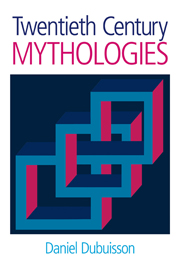Book contents
- Frontmatter
- Epigraph
- Contents
- Foreword by Professor Robert A. Segal
- Preface
- Abbreviations
- Introduction: History and comparative epistemology
- Part I Georges Dumézil, or Society
- Part II Claude Lévi-Strauss, or the Mind
- Part III Mircea Eliade, or the Sacred
- Conclusion: Modern theories of myth and the history of Western thought
- Bibliography
- Index
Introduction: History and comparative epistemology
- Frontmatter
- Epigraph
- Contents
- Foreword by Professor Robert A. Segal
- Preface
- Abbreviations
- Introduction: History and comparative epistemology
- Part I Georges Dumézil, or Society
- Part II Claude Lévi-Strauss, or the Mind
- Part III Mircea Eliade, or the Sacred
- Conclusion: Modern theories of myth and the history of Western thought
- Bibliography
- Index
Summary
Since the subject of this book is not so much myth itself as the theories propounded about myth(s) during the past sixty years, it has set itself a precise goal: to define an approach and a method that will reveal a supplementary way of looking at the history of thought. Its approach will thus try to bring together diverse hypotheses and definitions of myth (or myths) into a coherent whole such that each hypothesis with its particularity will nonetheless profit from the ensemble. The term attributed to this method – comparative epistemology – allows for the analytic approach as well as the comparative option, itself a constant and indispensable tool.
My choice of authors is based on a simple premise: their exemplary works dominated the field of mythological study from the end of the Second World War. The first is Georges Dumézil. His Indo-European and comparativist work legitimized a study that makes myth and ideology the two poles of an axis along which lies all that is imagination based in archaic Indo-European societies. The choice of Claude Lévi-Strauss as the second author is doubly justified, as his four-volume Mythologiques remains one of the major works of the second half of the twentieth century, and its influence was critical to structural theory, with its theoretical and philosophical dimensions pushing the study of Amerindian myth far beyond its starting-point. The third author, increasingly a subject of contention in scholarly circles, Mircea Eliade, was nevertheless chosen for two reasons.
- Type
- Chapter
- Information
- Twentieth Century Mythologies , pp. 1 - 4Publisher: Acumen PublishingPrint publication year: 2006



